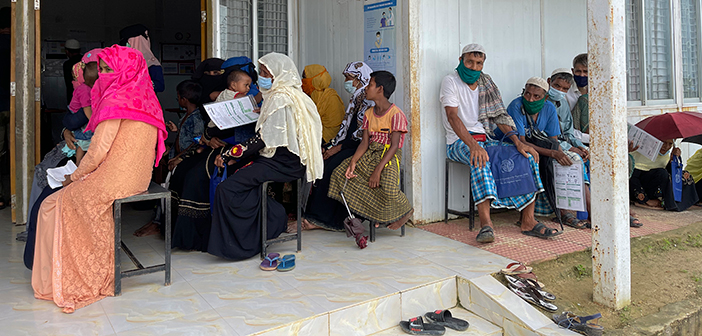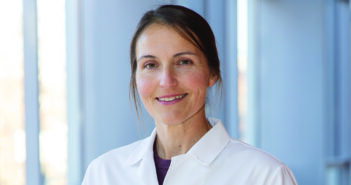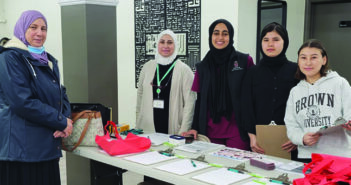Faculty and students mobilize in the US to support the COVID response in Rohingya refugee camps.
Since COVID-19 started to shut down the world in March 2020, our team at HAEFA (Health and Education for All) has been working tirelessly to serve the Rohingya refugees and the local community and protect our health care workers in Bangladesh. Thanks to countless volunteers globally, numerous partnerships, extensive crowdfunding, and our dedicated medical team members, we were able to launch a comprehensive emergency response to COVID-19 in the world’s largest refugee settlement in Cox’s Bazar, home to 1.1 million forcibly displaced Rohingya from Myanmar.
The Rohingya are refugees in Bangladesh following genocidal persecution, masskilling, and rape by Myanmar’s military since the 1970s. In August 2017, the military initiated their largest persecution campaign yet, forcing a mass exodus of over 700,000 more Rohingya to Cox’s Bazar (see Brown Medicine, Winter 2018).
In early 2020, the Rohingya refugee camps had only 47 functional hospital beds and zero ventilators. Overcrowding, insufficient sanitation, and poor nutrition were likely to make refugees more vulnerable to COVID-19 infection and mortality. At a density four times that of New York City’s, community transmission would be so rapid within the camps that within a year, some studies estimated, up to 98 percent of the population could be infected.
HAEFA’s solar-powered electronic medical record system, NIROG, provided an even more troubling picture. According to records from more than 100,000 patients treated since 2017, nearly 22.8 percent of Rohingya refugees belonged to the WHO’s “high-risk” groups due to chronic illnesses such as diabetes and hypertension. We also didn’t know how significant childhood malnutrition among the Rohingya would affect the generally benign COVID-19 outcomes observed in children worldwide. It appeared that the Rohingya, one of the world’s most persecuted minorities, were at risk of yet another ravaging decimation of their community.
Students, volunteers, and researchers mobilized to supply HAEFA with the funds, training, and programs to tackle the virus in the camps. In spring 2020, two Brown students spearheaded the Students for HAEFA fundraising campaign.
Crowdfunding, donations from private companies and organizations, and grants supported our initial COVID-19 response in the camps. We worked hard to source PPE, essential medications, and other supplies, and to reduce the costs by producing gowns and non-surgical face masks in a converted local garment factory. We also distributed more than 500 hygiene packets including bar soaps, reusable cloth face masks, and bleach to families with high risk members just in time; the first case of COVID-19 in the camps was confirmed May 14, 2020.
HAEFA went on to partner with Project HOPE and Brown’s Center for Human Rights and Humanitarian Studies, which provided a COVID-19 Competency Training of Trainer course to more than 3,000 health care workers and policymakers in Bangladesh including 35 tertiary, district, and sub-district hospitals, 70 health care workers in the Rohingya camps, and the entire HAEFA team in Bangladesh. The training equipped health care workers with the most recent evidence-based knowledge of COVID-19 patient management and infection control. During the first wave, Bangladesh suffered the highest physician mortality rate in the world. We are immensely grateful to have been able to offer this training to help protect Bangladesh’s frontline workers and improve patient management.
Even after all these efforts, we had yet to confront the most complex challenge: addressing the social and cultural barriers to saving lives. From March to May 2020, our consultation rates dropped by 44 percent, largely due to widespread rumors that those infected with SARS-CoV-2 would be taken away from their families, isolated in treatment centers, and maybe even killed to prevent transmission.
Decades of persecution by Myanmar’s government had left the Rohingya community with little confidence in any governments or NGOs. We rapidly launched our COVID-19 Infection Prevention, Symptom Monitoring, and Contact Tracing Program in collaboration with the Center for Peace and Justice from BRAC University and the Richardson Center for Global Engagement. This initiative harnessed the power of trained Rohingya community volunteers to improve trust and ameliorate care for patients with COVID-19 symptoms. We were limited by a lack of laboratory testing, but when a symptomatic diagnosis of COVID-19 was made at a HAEFA clinic and the patient was referred for home quarantine, a trained volunteer would monitor symptoms for 14 days while encouraging proper hygiene, debunking common myths, and building trust. As a result, patients were providing an accurate representation of their symptoms and prognosis, which the volunteers relayed to the HAEFA clinicians to determine whether clinical follow-up or hospitalization was necessary.
Consultation rates have been extraordinarily difficult to increase, but we are confident that the impressive work of the volunteers and clinicians prevented a further fall in rates and saved countless Rohingya whose symptoms worsened after initial diagnosis. We know that community engagement in the camps holds the key to long-term community health. We hope to continue to harness this experience in all future work, throughout the pandemic and beyond.
As of August 29, 2021, according to official figures, it may seem like the Rohingya community has largely been spared the jarring devastation predicted. There have been 2,883 confirmed cases of COVID-19 in the camps and 30 deaths. The true extent of the outbreak is plausibly larger than official numbers, but still lower than the direst predictions. Insufficient testing facilities and widespread stigma associated with testing contribute to this trend. Despite reasons for optimism, in just one week in August, 120 patients tested positive for COVID-19, with a positivity rate of 12 percent—an exponential increase in confirmed cases and a worrisome indication of another wave.
It is likely that the pandemic will continue to trigger other emergencies in the overcrowded camps and may cause additional mortality. Heavy rains and monsoons caused flash flooding and deadly landslides throughout the steep hilly refugee camp this summer. Furthermore, the focus on COVID-19 and the decline in Rohingya trust in formalized health care are negatively impacting malnutrition screening, increasing high-risk home birth deliveries, and allowing chronic diseases to go unmanaged. Before the pandemic, 7.1 percent of our patients were hypertensive and 4.9 percent diabetic. They received weekly follow-ups and medicines at HAEFA clinics. While NIROG records enabled us to provide continuity of care for patients with chronic illnesses in the camps, COVID-19 has caused many of our patients to stop coming for check-ups and medication.
In order to prevent the spread of the virus in the camps, most services deemed non-essential have been suspended, including education centers and safe places for women experiencing gender-based violence. Not only is COVID-19 likely to be associated with increased morbidity and mortality among the Rohingya, but it may also have long-term effects on the mental health of a minority that has already experienced unimaginable trauma. It’s more important than ever that Rohingya refugees receive vaccinations in order to resume other activities in the camps, which are vital to long-term health, wellness, and peace in the camps and the neighboring host communities. After months of delays, vaccinations began August 10 for Rohingya over 55. In two weeks, 86 percent of that target group got their first dose. But major shortages delayed this effort. International resources must be mobilized to ensure that this population— with no political representation of its own—continues to receive vaccines, with a corresponding awareness and education campaign to encourage vaccination.
At HAEFA, we continue to do everything we can to serve the Rohingya to the best of our ability. We are investigating home delivery of medicines for chronic conditions and working with Rohingya community leaders to navigate the complex social and cultural landscape. We hold on to optimism, but we cannot ignore the tremendous stakes still at play for this community. As our lives begin to look more normal from where we sit and work remotely, we must remember that for many around the world it may be years before their lives return to their pre-pandemic “normal.” We must continue to advocate for communities that cannot advocate for themselves in the inequitable global race for vaccines. The current silence for the plight of the Rohingya is deafening.




